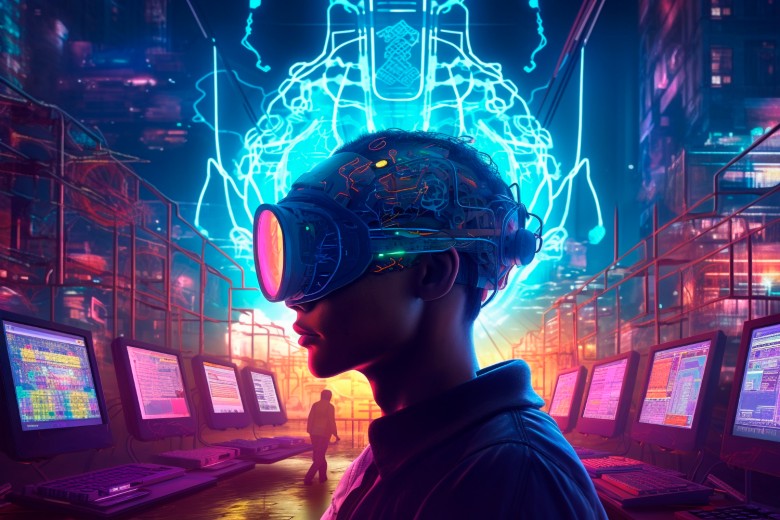
The gaming industry has undergone a remarkable transformation in recent years, driven by advancements in technology. Among these innovations, generative AI in gaming has emerged as a game-changer, reshaping the way developers create and enhance virtual worlds. By utilizing sophisticated algorithms and machine learning techniques, generative AI enables the creation of dynamic, immersive experiences that were once thought to be the realm of science fiction. This blog explores the impact of generative AI in gaming, highlighting its benefits, applications, and future potential.
What is Generative AI?
Generative AI refers to algorithms that can create new content from existing data. Unlike traditional AI, which relies on predefined rules and scripts, generative AI learns from vast amounts of information and produces original outputs. This capability allows for the creation of unique assets, from graphics and sounds to entire game environments, enabling developers to build richer and more varied gaming experiences.
Key Features of Generative AI
1. Content Creation:
Generative AI can produce new characters, landscapes, and items, significantly reducing development time.
2. Dynamic Storytelling:
It enables adaptive narratives that respond to player choices, enhancing replayability.
3. Realistic Interactions:
AI can generate intelligent non-player characters (NPCs) that react authentically to player actions, enriching the gameplay experience.
The Benefits of Generative AI in Gaming
1. Enhanced Creativity:
One of the most notable benefits of generative AI is the capacity to boost creativity. By automating repetitive tasks, developers can focus on more creative aspects of game design. For instance, instead of manually designing every texture or asset, generative AI can produce a variety of options, allowing artists to refine and select the best ones. This not only speeds up production but also leads to a greater diversity of content.
2. Increased Efficiency:
Generative AI streamlines the development process. Traditional game development often involves long hours of manual labor to create and test assets. With AI-generated content, developers can quickly iterate on ideas and test different designs, drastically reducing the time and resources needed to bring a game to market. This increased efficiency allows studios to allocate their budgets more effectively, focusing on innovation rather than routine tasks.
3. Personalized Experiences:
Another compelling application of generative AI in gaming is its ability to create personalized experiences. AI can customize game components for individual users by evaluating their behavior and preferences. For example, adaptive AI in video games can adjust the difficulty level based on a player’s skill, ensuring that challenges remain engaging without becoming frustrating. This level of personalization can lead to higher player satisfaction and retention rates.

Applications of Generative AI in Gaming
1. Procedural Generation:
Procedural generation is a technique that uses algorithms to create game content algorithmically rather than manually. This approach has been popularized in games like Minecraft and No Man’s Sky, where entire worlds are generated on-the-fly based on player interactions. Generative AI enhances procedural generation by introducing more complexity and variety in the generated environments, resulting in unique and unpredictable gameplay experiences.
2. Character Design and Animation:
Generative AI is also transforming character design and animation. AI tools can analyze existing character models and generate new ones that fit the desired aesthetic. This technology enables developers to create diverse and engaging characters without the time-consuming process of manual design. Additionally, AI can facilitate animation by automatically generating realistic movements based on predefined parameters, ensuring characters behave naturally in various situations.
3. Dynamic Game Worlds:
In traditional gaming, environments are often static, with limited interactivity. However, generative AI allows for the creation of dynamic game worlds that evolve based on player actions. For instance, an AI-driven environment might change its layout or aesthetics depending on the player’s choices, creating a more immersive experience. This adaptability can lead to unique narratives and outcomes for each player, enhancing accessibility and engagement.
4. Sound Design and Music:
Sound design is another area where generative AI can make a significant impact. AI can compose music that adapts to the game’s atmosphere, enhancing the emotional depth of a gaming experience. Furthermore, generative AI can create sound effects that respond in real-time to player actions, providing a more engaging audio experience. This innovation not only enriches gameplay but also reduces the reliance on pre-recorded audio assets.
Challenges and Considerations
While the potential of generative AI in gaming is immense, it is not without challenges. Concerns regarding originality and copyright arise as AI-generated content becomes more prevalent. Additionally, there is the risk that reliance on generative AI could lead to homogenization, where games begin to feel too similar due to shared algorithms.
Developers must strike a balance between leveraging generative AI for efficiency and maintaining the unique creative vision that defines their games. Ethical considerations around player data usage for personalization also need to be addressed to ensure player trust and satisfaction.
The Future of Generative AI in Gaming
The future of generative AI in gaming is bright, with the potential for even more groundbreaking innovations. As technology continues to evolve, we can expect to see increasingly sophisticated AI models capable of creating deeper narratives, more realistic characters, and entirely new gameplay mechanics. The integration of virtual reality (VR) and augmented reality (AR) with generative AI could lead to immersive experiences that blur the lines between reality and the digital world.
Conclusion
Generative AI is reshaping the gaming landscape, offering unprecedented opportunities for creativity, efficiency, and personalization. As developers continue to explore its potential, players can look forward to richer, more immersive virtual worlds that respond dynamically to their actions. Embracing this technology could redefine the way games are created and experienced, ushering in a new era of gaming innovation. With the expertise of a generative AI development company, the journey has just begun, and the possibilities are limitless.
Read More………………..


